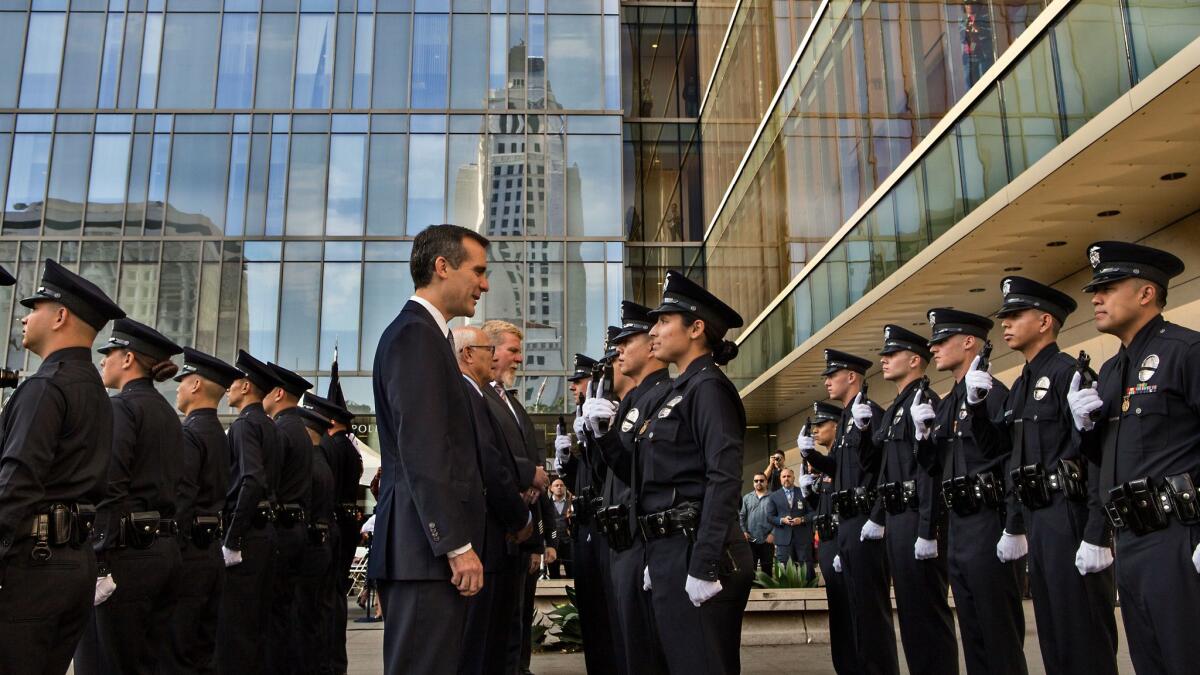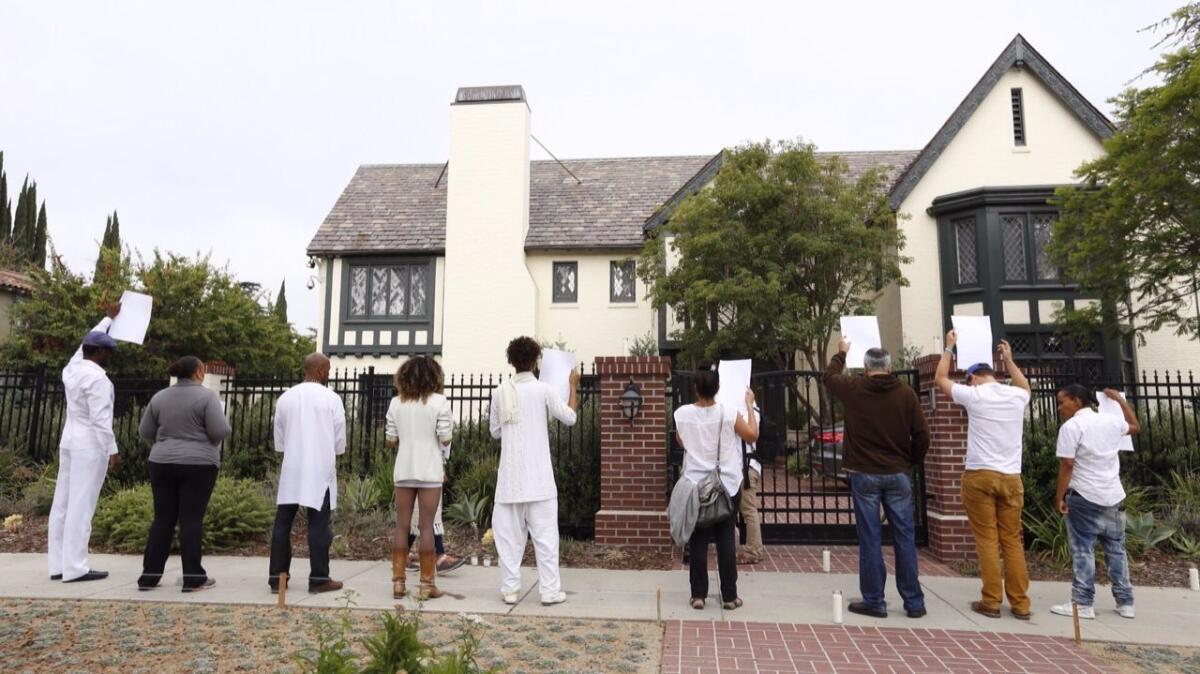A ‘backroom deal’? Groups that pushed crackdown on police misconduct were left out of talks between Garcetti and the LAPD union

For much of Los Angeles Mayor Eric Garcetti’s first term, advocacy groups have demanded greater accountability at the Los Angeles Police Department, saying officers who engage in major misconduct should face serious punishment.
Activists with Black Lives Matter confronted Garcetti at his home and spent part of last summer camped outside City Hall. Organizers with the Los Angeles Community Action Network have testified before Garcetti’s appointees on the Police Commission. And the American Civil Liberties Union repeatedly urged Garcetti to require the release of body camera video to ensure officers are held accountable.
Yet those groups — and the larger public — were effectively locked out as Garcetti and the LAPD’s rank-and-file officers union worked on an overhaul of the department’s disciplinary system, interviews and city records obtained by The Times show. Those talks, launched roughly two years ago, led to the creation of Charter Amendment C, which would introduce one of the most significant changes to the LAPD’s disciplinary process in decades.
Those same groups are now campaigning against the May 16 ballot measure, which would allow police disciplinary panels, also known as Boards of Rights, to be composed entirely of civilians. Foes warn the measure will make the panels more lenient toward officers, pointing to a city report that concluded civilians have been voting for less severe punishment.
Opponents also describe the measure as the product of a backroom deal between the mayor and a union known for its influence at City Hall.
“Police accountability, police transparency, police reform, is probably the top government issue of concern in communities of color,” said Pete White, executive director of the Community Action Network, a skid row advocacy group that also focuses on policing issues. “We should be the first, not the last, to be considered in creating reform measures.”
The debate over Charter Amendment C comes at a time of heightened pressure to rein in police misconduct, both in Los Angeles and across the country. Activists have filled meeting rooms waiting for police commissioners to reveal their decisions on whether shootings by LAPD officers fell within department policy.
Deputy Mayor Jeff Gorell, who handles public safety issues for Garcetti, confirmed that the ACLU and other groups were not involved in the discussions over changing the disciplinary process until after Council President Herb Wesson had publicly unveiled a ballot proposal in November. Gorell also acknowledged that his office had been in talks with the LAPD and the union about reworking the disciplinary process as early as 2015.
Still, the deputy mayor dismissed the idea that the measure is the product of backroom dealings, saying the proposal’s fate will rest with voters.
“This is going before voters in the most public way that a public process could be — and that is, by way of democracy,” he said.
A union spokesman offered similar remarks, saying the public had an opportunity to weigh in once a formal proposal was announced last fall. The initial conversations with city officials, he added, constituted labor discussions that are typically confidential.
The LAPD’s Board of Rights system was established in 1935. Voters added civilians to the panels in 1992 as part of Charter Amendment F, a measure designed to reform the department in the wake of the Rodney G. King beating.
This is going before voters in the most public way that a public process could be — and that is, by way of democracy.
— Deputy Mayor Jeff Gorell
Board of Rights panels currently consist of three members: two high-ranking officers and one civilian. Hired by the Police Commission, civilian panelists must have at least seven years of experience with arbitration, mediation or similar work. Most are attorneys or professional arbitrators.
Under the existing system, Police Chief Charlie Beck must send any officer he wants to fire to a board for a hearing. If the panel finds that an officer is guilty of the accusations, it then must recommend either firing the officer or assigning a lesser penalty, such as a suspension.
The chief can accept or reduce that punishment. However, he cannot increase its severity.
Gorell and union leaders contend that the addition of all-civilian panels will address longstanding complaints from LAPD officers about the integrity of the disciplinary process. Officers believe they will not get a fair shake as long as two-thirds of the panel’s members are in a chain of command under Beck — the person who is recommending punishment, said union President Craig Lally. Union officials often point to lawsuits filed by LAPD captains, alleging they faced retaliation after going against the chief in disciplinary cases.
Giving officers the power to request all-civilian panels will provide greater fairness, Lally said.
“That’s why we’ve been advocating for it for the last couple of years,” added union spokesman Dustin DeRollo.

Beck has disputed the idea that he influences the boards, noting that in more than half of recent cases, the panels reject his recommendations.
The Los Angeles Police Protective League has exercised its political might at City Hall in recent years, spending more than $1.5 million to support Garcetti’s opponent in the 2013 election. This year, the union has spent more than $135,000 to help reelect five incumbent council members.
The effort to change the LAPD’s disciplinary process followed on the heels of the union’s 2015 contract talks. That year, Garcetti appeared at the union’s annual delegates conference and informed league officials that he was willing to sit down with them to discuss alternatives to the existing discipline system, Gorell said.
After several months of talks, Garcetti signed on to the idea of testing a system of all-civilian panels for a limited number of years. Lawyers for the union suggested that the proposal be attached in some way to the league’s contract, Gorell said.
But City Atty. Mike Feuer quashed that idea and in 2016 advised city leaders that such a change would require an amendment to the City Charter — the city’s governing document — and a public vote.
Lally blasted Feuer’s opinion in a column in the June issue of the police union’s monthly magazine, saying the union’s leadership thought they were “finally on the verge of fixing the broken Board of Rights system.” Gorell, he added, had discussed the progress between the two sides during an appearance before union delegates earlier that year.
In June 2016, the league and its lobbyist met with Wesson and his staff at the Palm Restaurant, a steakhouse in downtown Los Angeles, to discuss efforts to draft a charter amendment. In the months that followed, the union’s lobbyist sent emails to aides of Garcetti and Wesson suggesting language.
“The mayor and the [union] board have been going back and forth for months but I think there’s light at the end of the tunnel on possible consensus,” Gorell wrote in an Oct. 25 email to a Wesson aide, a copy of which was obtained by The Times.
Wesson announced his intention to pursue a ballot measure changing the disciplinary panels the day before Thanksgiving, signing a motion to put the idea before voters as soon as May.
Advocacy groups that focus on police discipline say they were taken aback by that move — and were asked to weigh in only after the proposal was a done deal.
“There’s no way that they didn’t realize that people are interested in this issue. So the choice not to consult any of those groups had to have been deliberate,” said Peter Bibring, director of police practices for the American Civil Liberties Union of Southern California.
The process used by Garcetti and his aides “didn’t show any interest in hearing all sides,” Bibring said. “They only showed interest in providing a political favor for a powerful constituency.”
There’s no way that they didn’t realize that people are interested in this issue.
— Peter Bibring, director of police practices for the ACLU of Southern California
Bibring and other foes of Charter Amendment C have repeatedly hammered on the findings of a report, issued to the council in January, that found that civilians have been “consistently more lenient” than their sworn counterparts in LAPD disciplinary proceedings. Gorell and union officials have disputed the findings of the report, saying it did not offer enough data to reach such a conclusion.
“We trust civilians in juries,” Gorell said. “We trust civilians to look over the Police Department for discipline cases with the commission. We trust civilian oversight in the military. This is the bedrock of our governance.”
Garcetti has thrown his weight behind the campaign for Charter Amendment C, appearing in nine campaign mailers promoting it. Wesson and every member of the council have endorsed the proposal.
The union has already spent at least $839,000 on the effort to pass the measure. By contrast, opponents have not yet formed a campaign committee. Nevertheless, they say they are steadily building a coalition against the proposal. They argue that while the disciplinary system needs changes, the ballot measure is not the solution.
Wesson, who represents part of South Los Angeles, offered some of the measure’s opponents the opportunity to speak out on the ballot proposal — and other policing concerns — at a council hearing set for Tuesday evening. In an interview, he acknowledged that the city could have done better outreach to community groups focused on police discipline.
”If I had a chance to do some of the things differently, I probably would,” he said.
Twitter: @DavidZahniser
Twitter: @katemather
ALSO
LAPD settlements soar as officials close the books on high-profile lawsuits against police officers
Young LAPD officers barely remember 1992 riots, but work in a department shaped by the unrest
ACLU sues LAPD over ‘systemic violation’ of public records law
More to Read
Sign up for Essential California
The most important California stories and recommendations in your inbox every morning.
You may occasionally receive promotional content from the Los Angeles Times.











